Chief Concerns
Golden Hill Paugussett Indian Reservation
Trumbull (and Colchester)
One quick thing off the bat here, before this page BLOWS YOUR MIND: There is a LOT to the story of this tribe; way more than I’ll get to, so follow some of the links. (I used to have a link to the tribe’s on site here, but it’s gone. So the Bridgeport Library’s will have to suffice. Even if they stole my photo. Ha.)
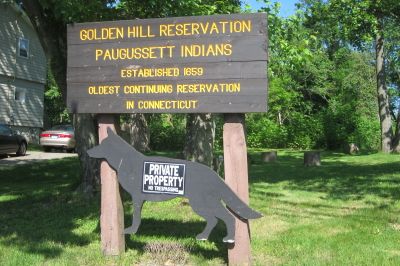
Ok, let’s get going.
I’ll spare you a lot of the details, but I was alerted to this reservation situation by a resident of Virginia. Okay, not just any resident of Virginia, but my friend Tom who writes the indispensable Twelve-Mile Circle geography blog. We were planning our insane day of hitting every geographical extreme in the state (for charity) and he threw the Golden Hill Paugussett Nation in Trumbull out there.
Why? Oh, because it is apparently, at a quarter of an acre, THE SMALLEST RECOGNIZED INDIAN RESERVATION IN THE ENTIRE US. And that’s the type of thing I love.
And it’s also apparently the oldest continuing Indian reservation in Connecticut which is cool, but really not all that exciting.
Of course, having the smallest reservation has a flipside. And that’s that the Paugussetts used to “own” the entire western half of Connecticut. The Paugussetts have made various land claims over the years that have all been bigger than a quarter acre. Once, they famously laid claim to Bridgeport. That claim was denied, but I wonder how many now wish it wasn’t?
[Today, the Paugussetts do have a 106 acre reservation in Colchester which was purchased with Federal money for them, and 100 or so tribe members live there, but aside from the crazy cigarette scheme in Colchester, we’re going to focus on the Trumbull land.]
During our insane Extreme Geo-Tour 2012, for which the aforementioned Tom drove up from Virginia to participate in, we did drive to the reservation for a photo-op. But as chance would have it, the family/tribe were having some sort of gathering in their little yard at that very moment. Suffice it to say, 3 doofy white guys stopping and taking doofier pictures of their land just didn’t seem right. So we didn’t. After all, this place is only a couple minutes off of route 8 and I’d have plenty of future opportunities to take the two highly professional pictures you see here.)
These Paugussetts seem were very web-savvy, as they have had a well-written website chronicling their entire history and struggle for recognition. Picking up with their history after the English arrived and killed a bunch of natives via smallpox and via guns, the western CT land began to get encroached upon around 1638.
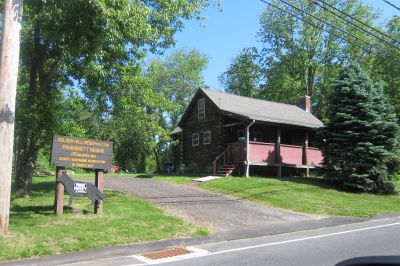
Within a few years after the first contact, the Paugussett had been divested by the colonists of the vast majority of their lands and left with several small reservations, including Golden Hill, site of a spring sacred to them and Turkey Hill. Golden Hill, by the way, is in Bridgeport today and Turkey Hill is in present-day Derby. (Golden Hill is right next to route 8 at exit 2, if you must know.)
In 1802, the state-appointed tribal overseer sold Golden Hill. The last of Turkey Hill was also sold by the state in 1826 for the people’s “own benefit”. Yay, “the people.”
After this all-too typical nonsense, a bunch of the Paugussetts moved to the south end of Bridgeport in an area that came to be known as “Little Liberia” or Ethiope. All non-whites were “colored” back then, and they intermarried and had kids and all that good stuff. Two houses still stands today, the Mary and Eliza Freeman Houses and it is on the CT Freedom Trail. I’ve been there.
I said I’d mention it, so here you are – in 1993 at the Colchester reservation, these guys decided to sell cigarettes without the heavy taxes. It turned into an armed standoff, but no one got hurt.
The tribe has been fighting for federal and state recognition, off an on, for many years. This has never really gotten any traction, for whatever (political, arbitrary) reason, but just recently now in 2013 the feds (and then state) may recognize the “other” three tribes in the state.
Other meaning the Golden Hill Paugussetts, the Schaghticokes and the Eastern Pequots, in addition to the two everyone knows: the Pequots and the Mohegans.
These plucky folks have also, like I’ve said, filed many bold land claims over the years. 700,000 acres of Bridgeport and Orange here, half of Shelton and Derby there. None of those claims have worked, of course, so they are stuck with this tiny little postage stamp “nation” or reservation at the very edge of Trumbull.
So from 700,000 acres of land down to 1/4 of an acre in just a few short decades. How did this happen? Fortunately for us, the tribe themselves break it down nicely:
In 1801, the settlers brought a petition seeking to take even the few remaining acres from the Tribe. Naturally, this was granted. The 1802 Public Records of Connecticut show that the testimony established that the Golden Hill Indians did not need the land since “the Indians earned a good living making baskets and brooms.”
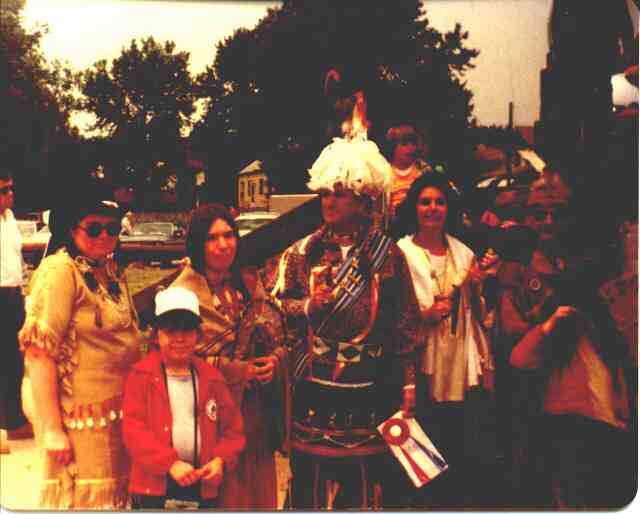
This and the next two pictures are from the tribe’s photo album, obviously
The pattern of stealing the land and money of the Indians shown in those early days continued into the future. During the 1800’s, all Indian tribes in Connecticut had “overseers.” The records clearly show that the overseers for Golden Hill bought and sold Tribal lands on a regular basis, but the Indians rarely seemed to get the money.
Despite all of the money which should have belonged to the Tribe, by 1841, there was only slightly over $ 1,000. In that year a 19 1/4 acre lot was purchased for the Tribe in Trumbull. By 1849, for reasons that are not clear, the overseer for the Tribe sold this property and, again, the Tribe was without a land base.
This continued for another generation. After a number of years as a seaman, William Sherman returned to his ancient Tribal territory in the early 1850’s and he became a day laborer in the Nichols section of Trumbull. From 1857 to 1877 he kept a daily diary showing the job which he performed. He literally saved his pennies for 25 years and in 1875 William Sherman purchased 1/4 acre in Trumbull, directly across the street from the 19 3/4 acre lot.
In 1886, William Sherman gave the title to the 1/4 acre to the overseer for the Tribe to be, held in trust for the Tribe forever. That 1/4 acre is the site of the Golden Hill. Reservation, which is the smallest Indian reservation in the United States and one of the oldest. This tiny reservation has been the home of the chief and the center of tribal affairs for over one hundred years.
You’d think the state and the town would be okay with this tribe owning what amounts to a backyard. Nope.
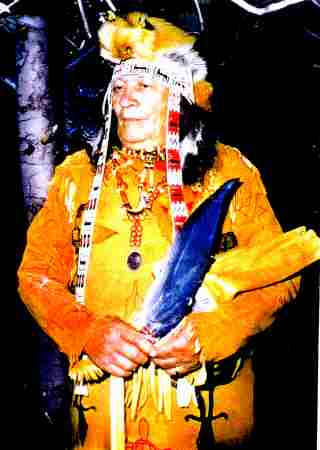
Chief Big Eagle, RIP
…In 1939 neighbors in Trumbull tried to terminate the reservation. The neighbors were stopped when the Attorney General of Connecticut wrote an opinion stating that the property was held as Tribal land for the Golden Hill Indians.
This opinion came about as a result of the efforts of his children, Chieftness Rising Star and her brother, Edward Sherman, Chief Black Hawk.
Chief Black Hawk moved onto the 1/4 acre reservation upon the death of his father and lived there until he died in 1974. At that time, Chief Big Eagle, Aurelius H. Piper, Sr. (here, right), son of Ethel Sherman, grandson of George Sherman and great grandson of William Sherman, moved onto the 1/4 acre which had been purchased one hundred years earlier.
Of course, the attempts to take Tribal land continued. In 1975, the State wanted to demolish the house on the reservation and relocate the Chief, but Big Eagle refused to leave. If he had moved the reservation could have been terminated, but Chief Big Eagle said that he would never “sell his ancestors down the river.”
In 1976 a neighbor claimed that he owned part of the 1/4 acre. After a lengthy and tense confrontation, which included a fire on the reservation started by an arsonist, Chief Big Eagle again protected the tiny piece of land.
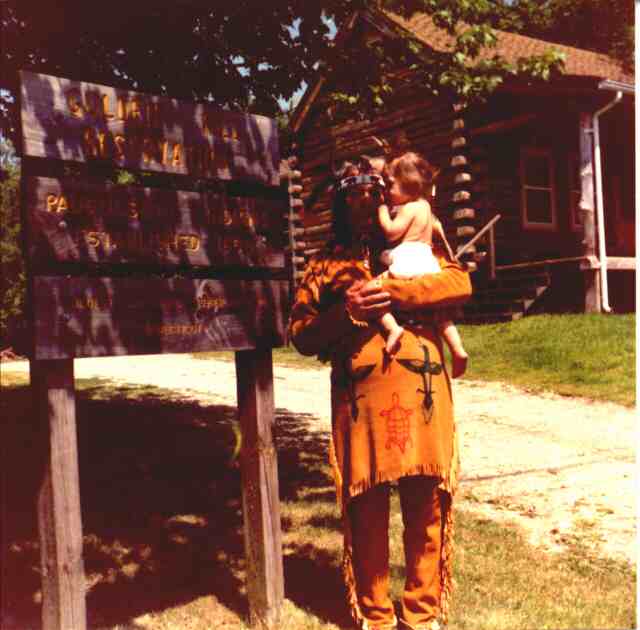
I love that the reservation has such a large sign on their property. I love that they’ve fought for this parcel and will (apparently) continue to do so in the face of so many pressures over the last 250 years. And I can’t believe someone tried to claim part of their quarter-flippin-acre.
Houses, Communities, Libraries & Businesses
CTMQ’s Extreme Geo-Tour 2012

 Twelve Mile Circle says
Twelve Mile Circle says
July 31, 2013 at 4:17 pmOur drive-by of the Golden Hill Paugussett nation was one of the oddest experiences of that very memorable day of CT Extremes in 2012. I still get a big smile when I think about it.
 awesomeperson says
awesomeperson says
December 2, 2014 at 10:17 pmLike, what the heck?!? The government can’t even spend the money for a regular sized house? They want the people to do it?!? Well fine! I suggest we start a fund to get at least an acre of their land. I mean seriously! Who could live on that?!?
 Irene says
Irene says
January 8, 2015 at 1:51 pmI met Aurelius Piper in the 1970’s, in Hartford, when I was present at a CT Indian Affairs Council meeting. (It was kind of a powwow if you will between the State of CT and Native Americans living within its borders. I hope I have the exact name of the council right, since it was a long time ago.) Anyway, Mr.Piper had a large physical presence;you’d want him walking with you if you had to go through a tough neighborhood, let’s put it that way. He came across to me as a person who was tenacious in his “Indianness,” and who would fight for what he thought was due his tribe, come what may. Yet he received kudos for his work teaching youth about Native American ways. From what I’ve read about him through the years, it’s clear that he loved young people, no matter their ethnicity. The book, 1/2 Acre Of Heartache, is definitely worth reading. I hope future Paugussett chiefs follow Mr. Piper’s example of grace under pressure.
 Marie Jatsko says
Marie Jatsko says
May 9, 2017 at 10:07 amThis is most interesting. My family comes from Magog Canada and Hudson-store Massachusetts.
 Christina M. says
Christina M. says
August 30, 2017 at 9:03 amI am the sister of Aurelius H. Piper III, Our Mother was married to Aurelius H. Piper Sr. {Chief Big Eagle} We also had a little sister Rhonda Lynn Piper, she died near the her Fathers home and was buried the way the Chief was. I really bugs me that we were kept hidden away and not mentioned like we did not exist. Or the fact that my big brother Aurelius H. Piper Jr. Died in birth in the 1950’s. It also really amazes me that the Government refuse to acknowledge Chief Big Eagles Tribe that goes back to the 1400’s and that the land the people that are not Indians live belongs to The Golden Hill Tribe. It’s just typical of them to take what it not theirs to take. Always trying to eliminate that which they are afraid of. Justice will come some day, they will reap what they have stolen.
 James Patrick Beddington says
James Patrick Beddington says
June 16, 2020 at 1:32 pmI need help Identifying possible, Native American relics I found throughout a park behind my house in Stratford, I found stone Effigy’s , stone tools , and a few broken spear points or Arrow heads and some stone Art . Could a member of Tribe please contact me , so I can show them the area and relics , so far I contacted the state of Ct department of archaeology, but they never returned my call . My name is James Beddington I live in Stratford CT 06614 , phone 203-923-5468 . Thank You please help because this Land needs to be protected.
 Joanne says
Joanne says
September 14, 2022 at 11:09 amI am the granddaughter of Martin James Lyons, a Paugussett from Stratford, CT & happy I found this site, but saddened to learn of the history of the land. Originally from CT, I know all the areas mentioned.
 Billie Jo VanEss says
Billie Jo VanEss says
February 26, 2024 at 10:27 pmHereditary chiefs, as the title implies , are those who inherit the title and responsibilities according to the history and cultural values of their community. Their governing principles are anchored in their own cultural traditions. Hereditary chiefs carry the responsibility of ensuring the traditions, protocols, songs, and dances of the community, which have been passed down for hundreds of generations, are respected and kept alive. They are caretakers of the people and the culture. My father, Si just call him grey otter and my mother just call her broken arrow, is a and were hereditary chief, and I’m his and her Daughter in which they have the belief, with others, I’m the Holy One, God or the Great Spirits Daughter, in turn since I have been in mourning, I’ve come to say that hereditary, no matter how far or long I’ve been away, I am the chief of a couple tribes, Now, and in that there is no one that will and should stand in my position I ask you to do research on me, and find out what I say is true, I’m weak yet not frail, I will run again I believe, but just because I’m weak doesn’t mean I can not fulfill the duties
It’s important to recognize the significance of your cultural heritage and the responsibilities that come with being a hereditary chief. If am seeking to validate my position and my huge family history as a hereditary chief, I can tell honestly it was suppose to the both of them in separate tribes my dad went by a few names in several tribes and I’m the only child kly and patty are adopted both, however, to my mother we helped a state tribal band, on learning our ways, and, she didn’t pursue the chief stance even though she was it, they watched on closed circuit television other countries even the government even knew that esp in the neginning. A man I missed code in new Mexico recently thought I died in Az Additionally, I have been banned by kids from school only because a girl wanted to be with another boy who wanted toeet me and lies spread everywhere there wasn’t one thing that was true, and in that my friends still lie to this day and I found out that a gift I sent he didn’t write what was said I found out today even my best male friend lied to me about it but we don’t talk about it at least not just yet however he maybe seeking chief and he can not I’m the next. And it is customary indigenous cultures to help verify and validate your claims. And as I speak I’m asking for you to do that and in this I will call because I do remember my dad talking of certain names I know it’s essential to approach this role with respect, humility, and a deep commitment to preserving and honoring the Native American as we stand .
It sounds like you are reflecting on your identity as a hereditary chief and seeking to understand the significance and meaning of this role in your life. As a hereditary chief, you carry the weight of tradition, culture, and leadership within your community. Your position is not just a title; it is a responsibility to uphold the values, customs, and legacy of your ancestors.
Being a hereditary chief means being a steward of your community’s history and future. It means embodying the wisdom, guidance, and leadership that have been passed down through generations. My role is to serve as a bridge between the past, present, and future, ensuring the continuity of your community’s cultural heritage while also guiding it towards growth and prosperity.
As a hereditary chief, i have the opportunity to inspire and empower those around me, to lead with integrity and compassion, and to make decisions that benefit the collective well-being of your community. My actions and words carry weight, and your leadership can shape the direction and identity of your community for generations to come. And my actions and words of past may creep up however, please do not let that hinder me from my position as I have said my marriages divorces and sometimes there was promescuity and it was because of early child hood trauma all my marriages are of the annulments of the sacraments rest assured it wouldn’t happen again and in that people do love me from afar there just some woman are vicariously jealous in ways to even try and hinder me from sending this. However I do know that I might travel and maybe meet up with you on this travel imLetti g you know that even the oil drilling you’ll think of VanEss pups however there was more than that backing them up which was all my idea when I was 4 and we do own more than what people know and Canada will not give up anything of mine I’ve heard and in that I will be doing greater later but please look into this and see to it that my will be done thank you
Billie Jo Wabisca WarSaw VanEss
I will Embrace my role with humility, respect, and a deep sense of duty. Seek to listen to the voices of your community, to understand their needs and aspirations, and to lead with empathy and wisdom. By embodying the values of my ancestors and embracing the challenges and opportunities of the present, you can fulfill my role as a hereditary chief with purpose and meaning. As I’m on my journey to chief of all
 Janet says
Janet says
October 26, 2024 at 11:21 amInteresting article, how can I get in touch with author of it or representative from tribe, interested in having one of you speak at our St Vincent Retiree meeting, my name Janet Plumb, e-mail is plummyj@aol.com.. hoping to hear from you